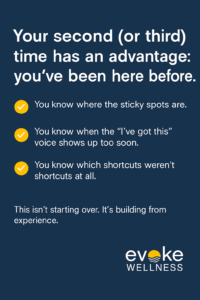Sometimes it’s not about getting to rehab—it’s about getting back. Maybe you left early. Maybe you ghosted after a few days. Maybe life hit hard and the old patterns won. Whatever your path, you’re not broken, and you’re definitely not alone. Going back to treatment doesn’t mean you failed; it means you’re brave enough to try again. This time, you’re walking in smarter, stronger, and way more self-aware.
Your Second (or Third) Time Has an Advantage: You’ve Been Here Before
Here’s the truth: most of us don’t stick the landing the first time. Addiction doesn’t get solved in one shot, and you don’t become a different person overnight. But coming back? That’s power. Now you know where the sticky spots are. You know when the “I’ve got this” voice shows up too soon. You know which shortcuts weren’t shortcuts at all.
This isn’t starting over. It’s building from experience.
Pack Differently—Pack for Growth, Not Just Comfort
Forget the first-timer survival checklist. You’re not walking in wide-eyed this time. Pack with intention.
- Bring photos of the people or life moments that remind you why you want to heal.
- Bring a simple routine: clothes that don’t make mornings complicated, shoes that let you move.
- Bring a journal—not to be the “perfect client,” but to unload the messy stuff before it festers.
- Leave space in your bag—you might come home lighter than you ever thought possible.
A residential treatment program isn’t a punishment zone. It’s a pause button—and you get to fill that pause with whatever helps you heal.
Call Out the Self-Sabotage Patterns Before They Start
You know your escape hatches. Maybe it’s convincing yourself you “don’t need this” after the withdrawal fog lifts. Maybe it’s zeroing in on someone annoying in group therapy as a reason to leave. Maybe it’s boredom, anger, or the constant itch to control everything.
This time, call it before it calls you out. Write it down before you arrive. Tell your counselor on day one, “This is what usually gets me to bail.” It’s not about failing—it’s about seeing your patterns clearly enough to disarm them.
Detox Is Just the Beginning—Stay for the Real Work
Anyone can white-knuckle a detox. Getting through withdrawals isn’t the win. The win is what happens after—the day-by-day digging, the emotional honesty, the uncomfortable growth that doesn’t come from numbing out.
At Evoke Wellness in Cohasset, MA, our residential treatment program doesn’t just stabilize your body—it gives you space to understand your story. Take the time. Go deeper. Push through the awkward group sessions. Sit in the therapy chair even when it’s uncomfortable. You don’t need another short-term fix. You need a chance to get your life back.
Prep for Life After Rehab—Start Before Discharge
The mistake most people make? Leaving rehab without a plan. If the only goal is “get out,” relapse is waiting.
This time, think beyond the doors:
- Line up outpatient care before you leave.
- Check out sober living options if home isn’t stable.
- Start looking at local aftercare programs in Massachusetts.
- Talk to alumni who’ve walked out of these doors and stayed on the path.
Your discharge day shouldn’t feel like a cliff—it should feel like a bridge you built yourself.
This Time, Ditch Perfection—Go for Curiosity
You don’t need to be the all-star rehab client. You don’t need to “nail it” every day. You need curiosity. Curiosity is the thing that keeps you moving forward when motivation fails. Curiosity asks, “What if I’m not doomed to repeat this?” Curiosity invites you to listen instead of checking out, to engage instead of pretending.
The ones who stay sober aren’t the most disciplined—they’re the most willing to stay curious.
You’re Not a “Dropout” Story—You’re a Resilience Story
The mind loves labels. “Dropout.” “Failure.” “Lost cause.” Burn them. Your story is unfolding, and getting back up is always more powerful than the fall. Every person in long-term recovery has had false starts. You’re in good company.
At Evoke Wellness at Cohasset, we’ve seen people leave, come back, and leave again—until they stayed, until it stuck. Your story is still being written, and this chapter could be the one where everything starts to make sense.
A Metaphor You Might Recognize
Think of yourself like an old GPS recalculating. You took a detour, maybe even a U-turn. But the route is still there. You can reroute as many times as you need—the destination doesn’t disappear because you took a wrong turn. And every recalculation gets faster, smarter, and more dialed in.
Take the Hard Step, Gain a Clearer Life
It’s easy to stall. To tell yourself next week, next month, next crisis. But you don’t need another bottom to justify help. You just need a moment of honesty—a moment where you choose yourself, even when it feels scary.
You don’t have to fight alone. Call 866-931-6429 to explore how our residential treatment program in Cohasset, MA, can give you the fresh start you deserve.
FAQs About Preparing for Inpatient Rehab Again
Q: Will I be treated differently if I’ve been to rehab before?
A: No judgment, no shame. If anything, your experience is respected. Our team knows recovery takes multiple tries. We meet you where you are—every time.
Q: How long should I stay in a residential treatment program this time?
A: Longer stays typically lead to stronger outcomes, especially if past attempts were shorter. We’ll work with you to determine the right length of stay based on your goals, triggers, and needs.
Q: Can I work or go to school while in treatment?
A: Residential treatment means taking a full pause—but we can help with planning your transition back to work or school afterward, and discuss step-down options like intensive outpatient programs.
Q: What if I’ve already done the 12 steps and it didn’t work?
A: We offer more than one pathway to recovery. From trauma therapy to medication-assisted treatment to holistic care, there’s no one-size-fits-all here. This time, you get to explore what actually helps.
Q: How do I talk to my family about going back to treatment?
A: Be honest and direct: “I didn’t get what I needed last time, but I’m ready to try again.” If you need support, our team can help with family communication or counseling.





